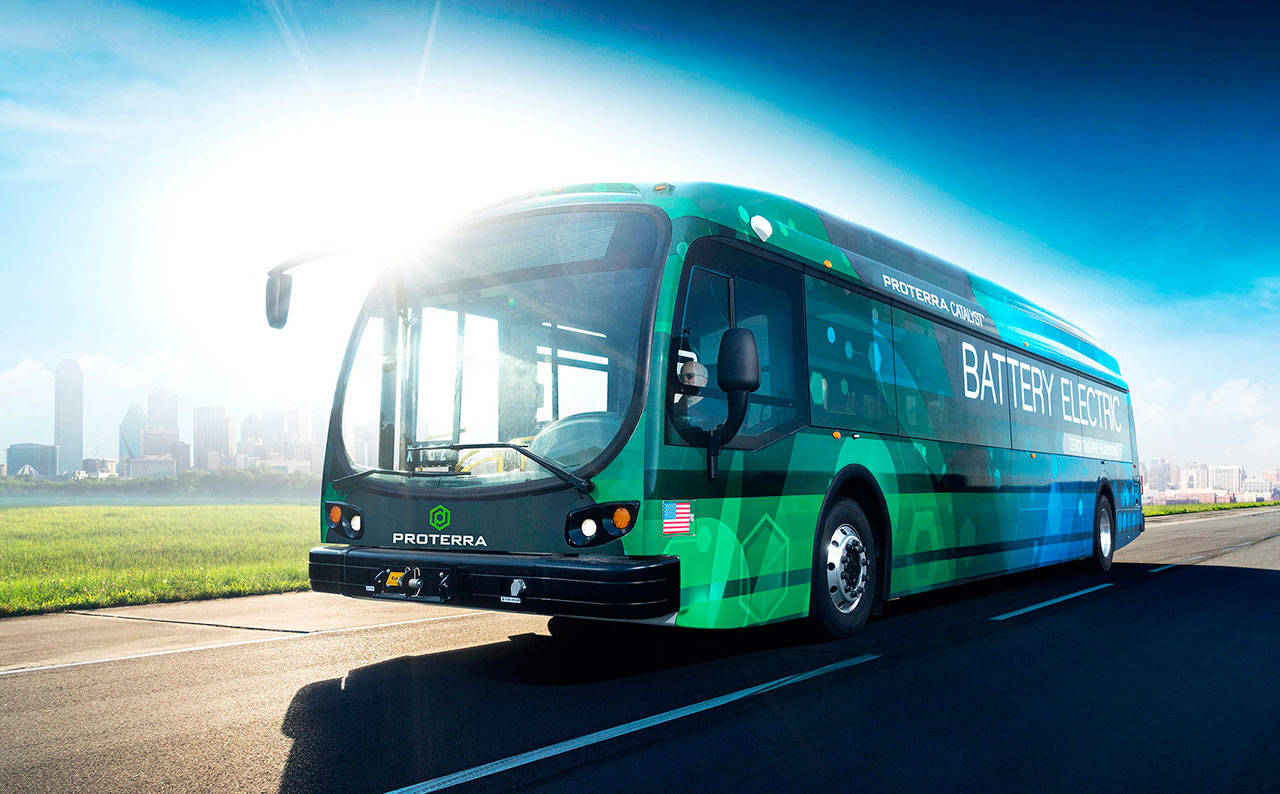By The Herald Editorial Board
With the arrival of Everett Transit’s first all-electric bus, which began service last week on Route 7 between the city’s College District and Everett Mall, riders can enjoy a quieter and virtually carbon-free journey that gradually is becoming more commonplace.
The electric bus, a 42-foot Proterra Catalyst E2 that can carry 31 seated and 18 standing passengers, is the first of four that the city transit agency is adding to its fleet through a $3.4 million grant from the Federal Transit Administration and a $600,000 match from the city. Three more electric buses are expected to arrive by the end of the year and will be used on Routes 7 and 6.
As outlined by The Herald’s Liz Giordano on Tuesday, the electric buses will deliver more than passengers. The transit agency, confronting a budget shortfall, will benefit from vehicles that are less expensive to maintain and operate. As the new buses begin service, they are replacing older buses, some more than 20 years old, that are more costly to maintain and that got only about four to six miles per gallon of diesel fuel.
Recharged through the Snohomish PUD electric service, the electricity the buses will run on is sourced 98 percent from hydropower and other renewable resources. Each bus will reduce the agency’s carbon monoxide output by 4,000 pounds and lower the amount of particulate emissions by 500 pounds each year.
The absence of a plume of diesel exhaust is immediately noticeable to — and appreciated by — riders as they exit and the bus’ electric motor whirs up and the bus heads to its next stop.
Everett Transit’s goal is to have electric buses make up half its fleet by 2022, further cutting fuel and maintenance costs for the agency and markedly cutting carbon emissions in the city.
Fittingly, transit and other agencies in the state should soon get a boost of funding to make more purchases and investments in electric vehicles, courtesy of an automaker that attempted to sell its diesel vehicles as something they weren’t.
More than three years ago, Volkswagen — after years of promoting its “Clean Diesel” engine technology as an alternative to electric and hybrid vehicles — was found to have used deceptive software in its vehicles that reduced diesel air contaminants during emissions tests. During normal operation, the VW vehicles were spewing up to 40 times the allowed levels of nitrogen oxides and other contaminants, including fine particulates, carbon dioxide and black carbon.
Caught cheating, Volkswagen agreed to a $14.7 billion settlement with the federal government. Washington state and 16 other states have since banded together as the U.S. Climate Alliance to put their portion of the settlement, $1.4 billion, toward reducing transportation emissions. Washington state’s Department of Ecology earlier drafted a plan for use of the state’s share of $112.7 million.
The agency is now reviewing public comments regarding its draft plan, but the proposal calls for the state to develop opportunities for electric buses, electric ferries, electric vehicles for use by state agencies and further development of the system of electric “fast-charging” stations that will extend the range of electric vehicles along I-5, I-405, I-90 and U.S. 2 and encourage their purchase by drivers.
The money could have its greatest impact in individual communities through grants to encourage the purchase of electric buses by local transit agencies, including Everett Transit and Community Transit, replacing older diesel-powered buses.
But increasing the number of electric vehicles in state, county and local agency fleets also would offer reductions in carbon pollution and savings to those governments.
Earlier this year, Coltura, a nonprofit organization that supports the transition from fossil fuels to electric and cleaner alternatives, published a report that examined how much of those fleets had been electrified in the 10 years since passage of a state law that required the state and local governments to convert to electric vehicles, “to the extent practicable.”
The group surveyed 31 local governments and state agencies and found only 6 percent of passenger and sport-utility fleet vehicles were electric. The report counted only 152 electric vehicles among nearly 7,200 vehicles among the fleets at five state agencies surveyed. Among three local governments surveyed, Everett has seven electric vehicles in its fleet of 295 passenger and light-duty vehicles; Snohomish County, five among a fleet of 481 such vehicles and the Edmonds School District, no electrics among its 93 comparable vehicles.
While there’s an upfront cost in investing in electric vehicles and their charging stations, Coltura reported the potential for significant savings, estimating that factoring in purchase price, taxes, cost of gasoline vs. electricity, maintenance and resale value, an electric vehicle such as the Chevy Bolt was nearly $1,600 less costly than a gas-powered Ford Focus over the life of the vehicle. Factoring in environmental costs, the organization said, boosted the savings to $2,600 per vehicle.
Transit and government agencies should take full advantage of opportunities — such as the VW settlement windfall — that reduce pollutants in the air we breathe and that contribute to climate change, while saving taxpayer money at the same time.
Talk to us
> Give us your news tips.
> Send us a letter to the editor.
> More Herald contact information.

























